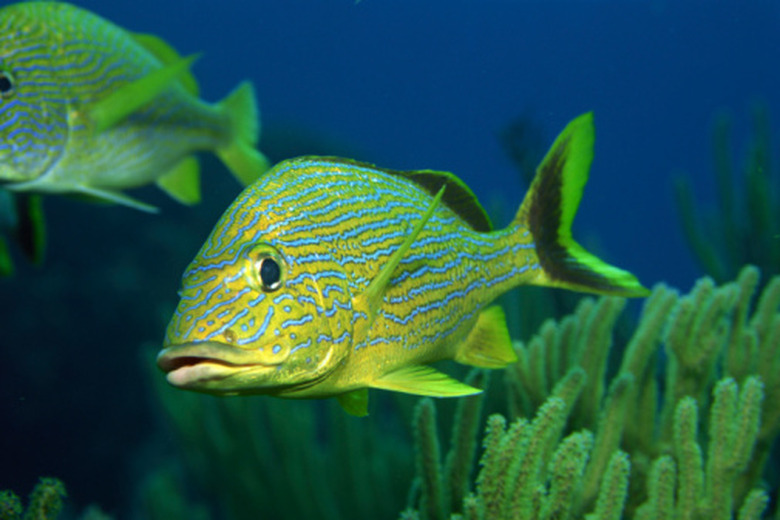Why Do Fish Breathe Slower In Cold Water?
Fish are cold-blooded animals, so when the water temperature drops, their metabolism slows so that they can survive in less than optimal conditions. In addition, since cold water holds less oxygen, warm-water fish slow their breathing and activity levels to adapt to these conditions.
How fish breathe
How fish breathe
Fish have gills that are supplied with small blood vessels. When the fish take water in through the mouth, the water passes over the gills, and the oxygen in the water passes into the blood vessels, while carbon dioxide leaves the bloodstream and reenters the water. There are several factors that determine how fast fish breathe, and water temperature affects both the amount of oxygen present as well as the rate of a fish's metabolism.
Ideal water temperatures
Ideal water temperatures
Like other cold-blooded animals, fish have specific temperatures ranges that are optimum for them. When temperatures are outside of this range, their metabolism changes, and they move to a new location with a more ideal water temperature if possible. The specific temperature range varies depending on the species, and there are cold-water and warm-water fishes who live in different bodies of water.
The ideal temperature for brook trout, for example, is 58 degrees Fahrenheit, although they do well with temperatures between 44 and 70 degrees. Walleye tolerate warmer temperatures between 50 and 76 degrees, although their ideal temperature is 67 degrees.
Oxygen levels and water temperature
Oxygen levels and water temperature
The amount of oxygen in water changes based on the water temperature. The warmer the water, the less oxygen is present in the water. When temperatures are higher than the fish's ideal temperature range, the fish's metabolism speeds up. Although the fish breathe faster in this state, they may not be getting enough oxygen, which is why hot water is often inhabitable for many species of fish.
The opposite is true of cold water. Cold water holds more oxygen than warm water, and fish do not have to breathe as much to get sufficient oxygen. In addition, when temperatures are lower than a fish's ideal temperature range, his metabolism slows down. This means that his breathing and other system processes, such as digestion, slow down.
Winter resting state
Winter resting state
Since fish have the ability to slow their metabolism, they can often survive over the winter months even when temperatures fall below optimum levels. Many fish species, such as koi, enter a resting state over the winter months. Since many bodies of fresh water freeze on top, the water underneath is insulated from the extreme cold. Fish may rest near the bottom where the warmest water is found.
Not all fish survive frozen conditions, however. Although they need less oxygen and cold water holds more oxygen, if the body of water is not deep enough, oxygen can become depleted in the remaining water that hasn't iced over, and since there is a layer of ice on top, oxygen cannot enter the water from the surface to supply the fish at the bottom.
Water temperature in aquariums
Water temperature in aquariums
In the wild, there can be great fluctuations in water temperature, so if a fish gets too hot or too cold, she can move to a better location. However, in your home aquarium, fish don't have this luxury. For the health and survival of your fish, it is critical that you maintain a consistent water temperature.
Make sure you have at least one thermometer monitoring the water in the tank and a heater to keep the water at a warm enough temperature. If your home gets too hot for your fish, you may also need to install a chiller to cool the aquarium water.
